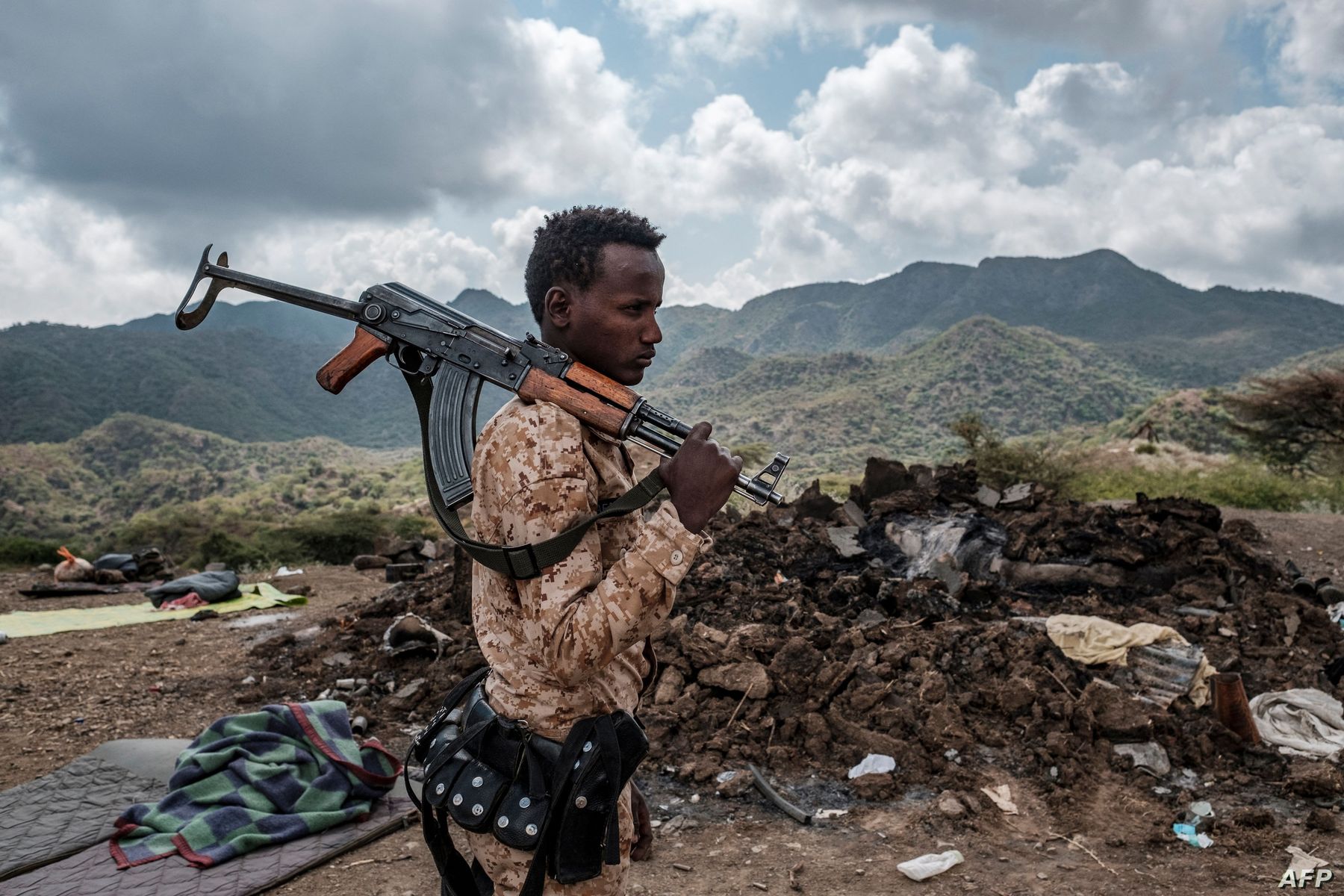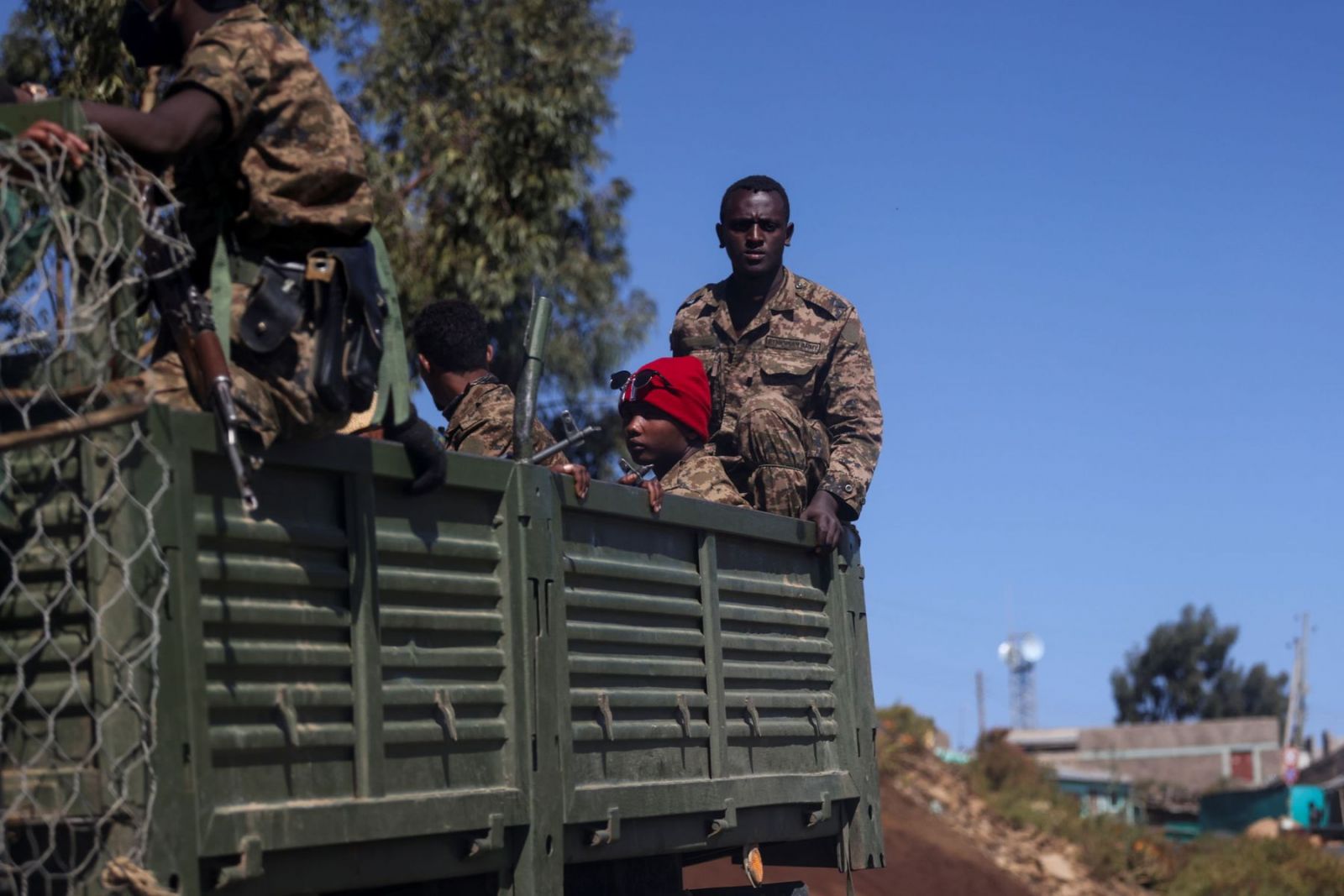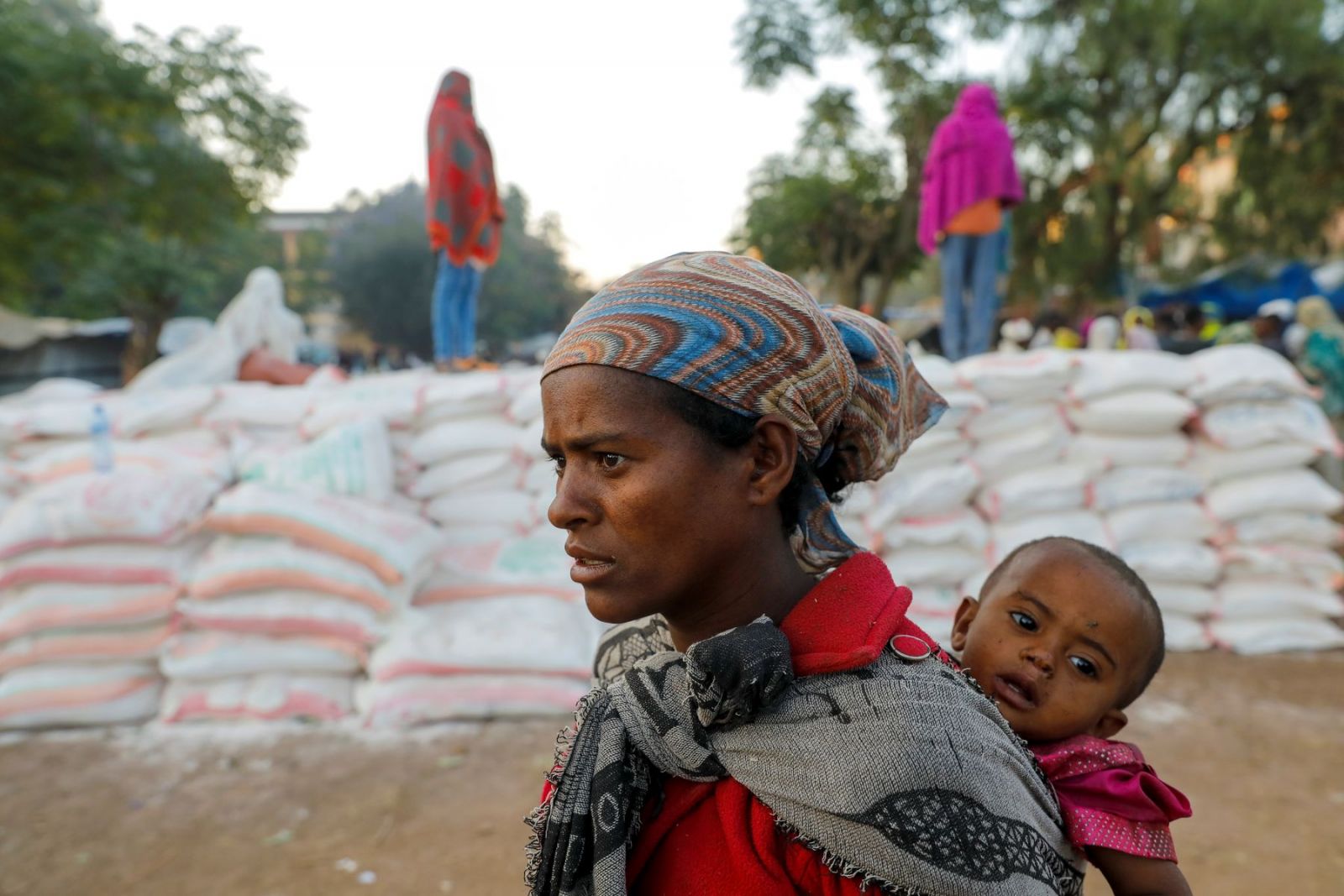
Ethiopia’s Prime Minister and 2019 Nobel Peace Prize winner, Abiy Ahmed, for signing peace with Eritrea, freeing political prisoners and extending his hand to political dissent, surprised the international community by declaring war on the Tigray People’s Liberation Front (TPLF). TPLF is a party and a guerrilla that has led for 27 years the Government of Ethiopia and all economic and military leadership positions, with great citizen protection in Tigray. Ahmed, who spoke of democracy and freedom when he came to power, is now ensuring a strict blockade of an area of his state to conceal the massacres in Tigray.

Ethiopia is the only country never colonized in Africa, except for the five years of Italian occupation (1936-1941). The majority of the population lives from subsistence farming and many do not have access to electricity. Within its limits, 110 million people live in over 80 ethnic groups, each with their own language. Among them are Amhara, Oromo and Tigray. 34% of the population of Ethiopia are oromas, one of the historically most oppressed ethnicities – slaves at the time of Emperor Hailé Selassié, 1930-1974, with 27%, and in Tigray, five or six million people live in the north of the country, on the border with Sudan and Eritrea.
Ethiopia was, until three years ago, the fastest growing economy in Africa, and it stood out as a certain oasis in front of the neighbours of the Horn of Africa, full of conflict. But that peace of mind is radically broken.
Since Abiy Ahmed was awarded the Oslon Prize, he has arrested opposition members and journalists, has accentuated preexisting discontent in several regions of the country and, above all, has launched a ruthless war against the citizens of Tigray arguing that they are "animals". The armed conflict has already caused more than two million displaced persons and international organizations have unanimously denounced the actions of the Government of Ethiopia: numerous killings of civilians, looting of towns and cities, thousands of refugees, over 400,000 people in extreme famine and, according to a study by Amnesty International, soldiers and militiamen have reported that women and young people in Tigray suffer from sexual abuse, including systematic sex.

Tigray, a small powerful, represents
only 6 per cent of the population of Ethiopia, but Tigray has been the main engine of Ethiopia’s policy. A TFLP-led coalition helped end Haile Mengistu’s Soviet centralist government in 1991. This change of power also brought with it the independence of Eritrea, which until then was in the interior of Ethiopia. And that is that Ethiopia is one of the few countries in the world that has in the Constitution self-determination and the right to secession.
Once the Tigrinys got power, they created a coalition party and a government that represented the major ethnic groups in the country, and distributed them to Ethiopia based on those ethnic groups. Thus, the TFLP, led by Meles Zenawi, ruled for almost twenty years (until 2012), harshly and crudely.
During these years under the command of TFLP, Ethiopia became an ally of the West in the 'war on terrorism', had significant economic progress, made significant investment in infrastructure and had the opportunity to access university for the first time tens of thousands of people. But it was also a time when political dissent was defeated in its entirety. Journalists, opposition leaders, protesters and bloggers were arrested and persecuted without piety.
Ethiopia is a capitalist regime, but, in the eyes of Europe, it continues to take socialist and/or nationalist measures. The land is not privately owned, managed and provided by the state for rent. Ethiopia is known as the New African China, due to the establishment of many factories in China thanks to the low rental prices offered by the State. The main telecommunications and energy companies, as well as airlines and public universities, belong to the State.
TFLP President Meles Zenawi was a figure of great authority, and in 2012, after his death, tensions that never disappeared from the country resumed more strongly. And so in 2018, after the bloody protests between the two most important ethnicities (oromas and breasts), the TPLF government found a figure that seemed perfect to calm the waters. For the first time, an oromo was appointed Prime Minister: Abiy Ahmed.
From Burkide to ‘the terrorist hyena’,
Abiy Ahmed, in his teenage years, fought alongside TPLF in the war against the Soviet regime of Mengistu, thus contributing to the empowerment of the tigrinys. Once the TPLF was in charge, it took care, among other things, of intelligence services. Because of his history, even though he belonged to another ethnic group, the fact that Ahmed was Prime Minister did not seem to be a major problem for TPLF. But Ahmed, to everyone's surprise, put almost everything upside down.
He came to power and in the first few months surprised the world. It liberated thousands of political prisoners; it abolished cuts to independent media; it allowed the return of opponents in exile; it created for the first time an egalitarian government of women and men in the history of Ethiopia; it dismissed authorities and military investigators for corruption and, above all, it signed peace with the "enemy": Eritrea. "Over time I have seen that it is an infamous and perverse authority, but I have to say against me that when it came to power I was a follower to Abiy Ahmed. What he did struck me as surprising. For example, it legalized all political parties and armed groups. That was spectacular. For example, exiled Romanian guerrillas in Eritrea returned to Adis Abbebara, the capital of Ethiopia, as if they had entered the city of The Rolling Stones." They are words of Mikel Bilbao, of Artziniega. He lived six months in Mecel, the capital of Tigray, three years ago. He's an engineer and taught at the university there. It has since followed closely the situation in Ethiopia and Tigray.

Signing peace between Ethiopia and
Eritrea as a stimulus to war was a trigger for the current situation with Isaias Afewerki, President of Eritrea, a passionate enemy of Tigray. During the TPLF's power, there was a war against Eritrea between 1998 and 2000.
"Tigray has always been a militarized camp, especially on the border with Eritrea, and when Ahmed started demilitarizing that area, the Tigrinys understood that movement had been made to leave them unprotected. The demonstrations spread throughout the region, Tigray was ready for war," says Bilbao.
That peace pact brought him a prize abroad and a home war to Ahhegoalde. When he received the Nobel Prize, he said that "war creates bitter, ruthless and savage men," no one knew that these would be characteristics of his politics and behavior.
In spite of the war,
Abiy Ahmed dissolved the coalition party running the government and created another party representing almost the same ethnic groups, but excluding the TPLF. Shortly thereafter, TPLF was included in the list of terrorist groups. And so, in November 2020, he formally declared war on his former members and former party colleagues, and, by extension, on a whole country: Tigray.
On the night of 4 November, Abiy Ahmed ordered an offensive against Tigray to justify the beginning of the war against a series of Ethiopian army commanders allegedly provoked by the TPLF. A month later, the Ethiopian Government proclaimed Tigray's rule. Ahmed said that there were no civilian casualties and that no foreign force had participated in the military campaign. But these rounded claims soon dissipated.
In order to dominate Tigray militarily, the Government of Ethiopia mobilized four main actors: the Ethiopian army, the Amhara Special Police Forces, the Amhara Fano militia and the Eritrean army. Few of them question the armed intervention of the scholars in Tigray, turning what was an "internal conflict" into an international war.

They first left Tigray
without light and communication, and then began "crimes against humanity," as documented by all relevant international institutions, such as Amnesty International, Human Rights Watch or the United Nations.
Along with the massacres, it has been a systematic violation of women. The troops of Ethiopia and Eritrea have raped hundreds of women and girls, according to Amnesty International (AI) in August. “It is clear that rape and sexual violence have been used as weapons to cause permanent physical and psychological harm to Tigray’s women and girls,” said AI Secretary General Agnes Callamard. According to the AI report, Tigray's health services have recorded 1,288 cases of sexual violence between February and April, but the number of unreported cases is much higher.
"It's become an ethnic problem. Hatred of the Tigrinis moves Ethiopian and Eritrean soldiers. That is the only way to understand the cruelties they have done. I've lived in the capital of Tigray, about 400,000 people lived in Mecel. It was a low-developing city, but with some progress. For example, a large advanced public hospital. It is totally destroyed today. There is nothing left. From where the armed men of Eritrea have gone, looting has been widespread. They have taken everything that can be stolen and have given fire to everything else," says Bilbao.

Ahmed's idea was a
quick war: occupying the entire Tigray during a brutal offensive and destroying the TPLF in a short time. But it underestimated the resistance.
"There is no one in Tigray who does not understand this conflict as a struggle for his people. The people of TPLF are militarily very prepared, they have very complicated pictures. During the offensive, the Tigrini guerrillas took refuge in the forests and, after six months, started counter-offensive," explains Mikel Bilbao. For a week, the Tigrinys regained the capital, causing a large drop among the occupying forces and confiscating a large number of weapons and war materials. "On the net you can see images of thousands of Ethiopian army soldiers detained by TPLF in Mecel," says Bilbao. For several days they recovered almost all of Tigray and Eritrean forces had to withdraw it.
Although there is a certain technical draw on the military side, all international actors say that the worst thing for citizens is for them. "The rainy season will soon come and there will be nothing to sow and no tools for cultivation, as looting and destruction has been total. And they haven't fled to where. Tigray is completely under siege," Bilbao said.

Famine is a
Bilbao weapon which has underlined that Tigray is a very poor area. Tigray needed over a hundred trucks a day of humanitarian aid to survive. It is a more African country that has never managed to get out of the evil wheel of malnutrition and international aid. According to OXFAM, half of the population lives below poverty in Ethiopia, data that grows even more in Tigray. However, the Government of Ethiopia continues to use hunger as the main weapon in this war, although it insists that it has never failed to honour its commitment to ensuring a safe path to the incorporation of humanitarian aid into Tigray.
According to UN emergency aid coordinator Martin Griffiths, the conflict must stop quickly. About 5.2 million people in the Tigray area, more than 90% of the region's population, need help to survive. Of these, some 400,000 are already in extreme hunger. And, of course, the first to suffer are the smallest: two-thirds of the people who die in starvation are small children.
On the other hand, doctors and citizens of a town in Amhara denounce the killing of 120 civilians by TPLF guerrillas in early September. This attack has not yet been ratified by any independent organization and TPLF has denied its participation. Spokesman Getachew Reda noted the following: “We firmly reject the fact that our forces have been involved in the killing of civilians and demand, moreover, an independent investigation into all the horrors that have occurred.”
And now what?
"Abiy Ahmed calls on all war-capable Ethiopians to join the army to participate in the 'final attack'. The president of the Amhara region brings together all religious leaders and asks them to join the 'religious war' against Tigray. The killings of Tigrinys living outside the Tigray are multiplying, for example in the capital of Addis Ababa. The media and official institutions say that Tigray and TPLF are terrorists. They do not consider it a legitimate agent, which impedes the door to any peace agreement," said Mikel Bilbao.
The media and armed blockade imposed on Tigray continues. The number of displaced persons and deaths is increasing. The TPLF is fighting on several fronts and the Ethiopian Government is preparing a broader military offensive. The international community (EE.UU., China, the European Union or the African Union headquartered in Addis Ababa) has shown, at the most, a "concern" about the situation in Ethiopia, without moving its finger. Therefore, if someone or something does not stop it, all the conditions are laid down for the massacre to survive.
Barack Obama, the Nobel Peace Prize, is the president of history who has ordered more people to be killed by drones. Well, Abiy Ahmed also wants to be part of this cruel story, with a curious title: the criminal war with a novel of peace.
Ethiopia, 24 November 1974. Lucy's skeleton was found in Hadar, one of the oldest traces of human ancestors. The Australian hominid of Australopithecus afarensis is between 3.2 and 3.5 million years old.
So they considered it the ancestor of species, the mother of all of us. In... [+]
Azken mendean Etiopiak galdu ditu antzinako oihanik gehienak, nekazaritzaren, artzaintzaren eta herrialdean laborantza industrial neokolonialak eragindako goseteen presiopean. Alabaina, biodibertsitatez betetako azken baso zatiak geratu dira, fosil gisa, zientoka eliza eta... [+]